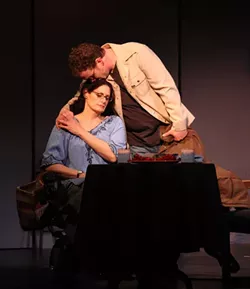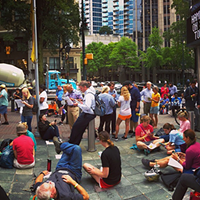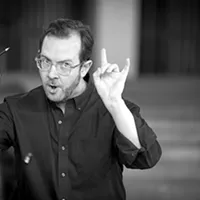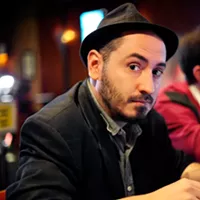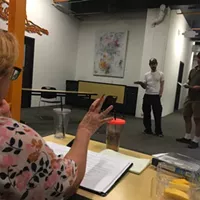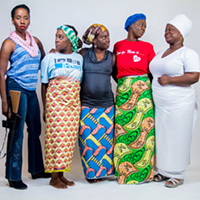The Normal Heart continues Charlotte's struggle with a tough topic
AIDS still kills — at the box office
By Perry TannenbaumThirty-five years after a new illness began afflicting gay men, local theater companies shouldn't have trepidations about staging a drama which recaptures the original anguish of the AIDS crisis. Yet, as the fine Theatre Charlotte production of Larry Kramer's The Normal Heart reminded us on opening night, bringing up the subject in the Queen City is still fraught with peril.
Charlotte hasn't had the most distinguished history in coming to terms with AIDS. Marring our New South cachet, we've often behaved badly. Religious demagoguery and homophobia have frequently replaced tolerance, rational thinking and pragmatism. What makes our experience in the Queen City so unique is how often local theater companies have stirred up the zealots, the bigots and the prudes.
It wasn't always that way. Back when the Queens Road barn was known as the Little Theatre of Charlotte, I reviewed William M. Hoffman's As Is in the first issue of the Loaf in 1987. Before garnering raves, national fame and opprobrium as Prior Walter, Alan Poindexter directed Jeffrey for his Innovative Theatre in 1995 at Spirit Square.
Our most notorious cultural kerfuffle, Charlotte Rep's 1996 production of Angels in America, packed all three Reaganite bugaboos — nudity, homosexuality and AIDS — into one epic seven-hour production in the heart of our Uptown. Since that cataclysm, there have been a precious few AIDS-themed productions by other local theater companies, none of them embarrassing the city nearly so terribly.
After Rep stirred up the homophobes again with John Guare's Six Degrees of Separation in 1997, Stage One brought us our next confrontation with AIDS the following year, Terrence McNally's Love! Valour! Compassion! at Neighborhood Theatre in NoDa, where it was greeted with a sensational lack of outrage. Except for repeated visits from the national Rent tour, all was fairly quiet during the ensuing decade: Children's Theatre's brought The Yellow Boat to ImaginOn in 2006, and Carolinas Black Pride Movement staged Before It Hits Home at the old Afro-Am Cultural Center in 2009, the same year that Actor's Theatre presented the world premiere of Eric Coble's Southern Rapture, a comical commemoration of the Angels hysteria.
We were so past our former provincialism, right? When Theatre Charlotte brought Rent to Myers Park in 2011, it was a resounding hit. So why shouldn't Carolina Actor's Studio Theatre believe theatergoers would flock to NoDa when they revived Angels in America last spring — both Part 1 and Part 2?
Because it turned out Charlotte audiences, despite a vigorous wave of publicity for the Angels revival, no longer cared. We stayed away in droves, and box office woes for Angels contributed to CAST's demise. Attendance wasn't nearly as disappointing last week for the local premiere of the drama that snagged the 2011 Tony Award for Best Revival. But there were noticeably more empty seats in the back rows than I've seen at recent opening nights.
If the Tony Award plaudits and the HBO film adaptation aren't enough to lure you to Queens Road for the live experience — with an exemplary cast — it's legitimate to ask what The Normal Heart has to tell us that we haven't heard before. Plenty, folks. Plenty.
While As Is took us to the endgame guided by a hospice worker, and Angels spoke to the devastation that AIDS wrought upon gay partners and their families, Kramer's script focuses on the struggle to get the word out about the lethal new disease — before AIDS or HIV, let alone the lifesaving AZT, even had names. Nor is blame for inaction on the spread of AIDS in the crucial early stages of the pandemic exclusively leveled at the Reagan Administration. Or even Republicans.
No, at the epicenter of the new plague, New York City, Kramer's attack is four-pronged: at politicians, at the press, at the medical establishment and at gays themselves. The play is autobiographical. Kramer is a Jewish New Yorker whose politics lean left, and so is Ned Weeks, the playwright's protagonist. Both Kramer and his protagonist are activists, and Ned's new organization is based on the Gay Men's Health Crisis (GMHC) group co-founded by the playwright.
You can go down the list of characters — New York Times fashion reporter, Felix Turner; polio victim Dr. Emma Brookner; president of Ned's organization, Bruce Niles — and identify their real-life counterparts. But Kramer is way too furious with the major players to afford them the cover of aliases.
So it's bombs away at New York City's beloved Jewish mayor, Ed Koch, whose "how am I doing?" style lifted him high in the Democratic Party firmament. Nor does Ned significantly mute his ire at the Times even after Turner becomes his partner.
Kramer's personal drama replayed in a couple of ways when it was originally premiered at The Public Theatre in 1985. Koch was still mayor, soon to be re-elected for his third term, when Normal Heart opened smack in the cultural heart of the former five-term congressman's congressional district. And how much chutzpah does it take to open any drama in Manhattan that packs an all-out assault on the New York Times?
One of the things I like best about Kramer's depiction of Ned is his insight into his own tendency to antagonize the people who should be the most friendly to his cause. He sometimes realizes that he's actually performing his enemies' dirty work, but he can't help himself. People whom Ned offends still can't help but admire his passion and idealism.
It's like Kramer is telling us, with quintessential Jewish self-deprecation, "Welcome to the wonderful world of America's self-defeating, self-destructive Left Wing. See how two of the most potent weapons we have in our democracy, our peerless medical science and our vaunted free press, are wielded by wimps." Sounds a little like today, doesn't it?
Tommy Foster absorbs this subtle comical irony into his twitchy, eccentric portrait of the fiery Ned, a performance you shouldn't miss. A kindred spirit prods him, Cynthia Farbman as the iron maiden in the wheelchair, Dr. Brookner. Farbman is more consistently intense, embittered by the hundreds of death sentences she has had to pronounce face-to-face to gay patients — and the total community failure to mobilize against the disease.
It's Ned who has to navigate the Scylla and Charybdis of fundraising solicitude and persuasive argumentation. Director Dennis Delamar found a spectacular set of antagonists to fuel Ned's rage. Brandon James is quite suave initially as the closeted Felix, but he's the most harrowing thing we see once the lesions start spreading across his body. Paul Riley beautifully registers the inner turmoil of the activist organization's president, a closeted banker who has so much to lose.
Also at risk if the group becomes too radicalized is Chris Chandler as a closeted city worker, who loses it in one of the magnificent monologues. James Schmitt has the best cameo as the mayor's representative, but Matt Mitchell also hits it out of the park as an AIDS victim to get us started.
As Ned's straight elder brother Ben, Frank Dominguez represents most of us at the dawn of the '80s, just a little starchier in his yet-to-evolve homophobia because he's a lawyer. With so few people at the hospital, at the mayor's office, and at the Times willing to pay attention to Ned, Ben comes to represent everyone who was so slow to become sensitized to gays and AIDS.
Chris Timmons contributes one of his finest set designs to the production, often filling the flat walls as lighting designer with photos and news clips that document the script's accuracy. When Theatre Charlotte programs provocative shows, our best actors tend to flock to auditions, adding a professional luster to our community theater. That's what has happened at this show, so our community needs to show up.
Speaking of...
Latest in Performing Arts
More by Perry Tannenbaum
Calendar
-
 RuPaul's Drag Race Werq The World Tour 2025 @ Ovens Auditorium
RuPaul's Drag Race Werq The World Tour 2025 @ Ovens Auditorium -
 Boulet Brothers Dragula: Season 666 Tour @ N.C. Music Factory
Boulet Brothers Dragula: Season 666 Tour @ N.C. Music Factory -
 Jim Norton @ The Underground
Jim Norton @ The Underground -

Trap & Paint + Music Bingo @ Blush CLT
-

Trap & Paint (Hookah Edition) @ Blush CLT

